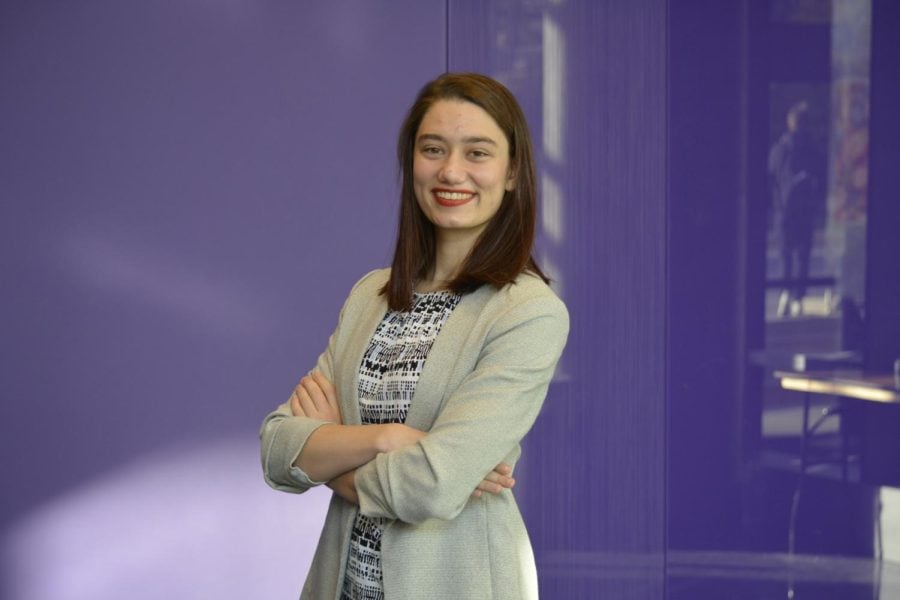Former NU student Ana Cornell explores future of genetic testing with Acorn Genetics
Ana Cornell, CEO and founder of Acorn Genetics. Cornell started Acorn at NU.
May 2, 2022
Former Northwestern student Ana Cornell spoke her first English words at five years old to instruct children scurrying around her “run field.” Cornell said she was always a “very bossy young child” with high ambitions.
In January, Cornell dropped out of NU to pursue these ambitions through her start-up Acorn Genetics, a genetic testing kit that allows people to learn about their genetic health in the privacy of their homes.
Cornell left NU after winning the Thiel Fellowship, which awards a stipend of $100,000 to young entrepreneurs under the condition they drop out of college.
Nicole, Ana’s sister, said it was not surprising Ana went into entrepreneurship.
“She’s always been a natural leader,” Nicole, a high school sophomore, said.
Cornell founded Acorn genetics because she wanted to help those who need genetic tests but are not comfortable with currently available options. When Cornell was 16 years old, her father was diagnosed with a genetic condition. She wanted to get tested for it as well, but she said insurance doesn’t cover 90% of genetic tests.
Cornell said she didn’t want to pay thousands of dollars and wait a long time to hear back about her genetic health. But her only other option was consumer-directed genetic testing companies. After doing research on these companies, she worried her genetic information would be sold to third parties.
“I didn’t want to compromise my bank account or my information by allowing direct consumer testing companies to subsidize that high cost by selling the information,” Cornell said.
About 45.7 million Americans want a genetic test but avoid them due to a lack of private and affordable options, she said. Her interest in genetics and background in biomedical engineering, which she studied at NU, drove her to search for a solution.
As an NU student, Cornell said she would spend time mapping out all the ideas she wanted to turn into a reality. Acorn came out of a sketch Cornell made when she was “bored” in an Engineering Analysis II class at NU, she said. She said she first pitched Acorn Genetics in her Principles of Entrepreneurship course. Cornell later got involved with The Garage, joining its various programs to support start-ups, including Propel, Jumpstart, Tinker and Residency.
After receiving the Thiel Fellowship, Cornell said dropping out was an easy decision, especially during the pandemic. At that point, she was investing most of her time into Acorn, which was her “escape from the pandemic woes,” Cornell said.
Though Cornell is not currently at NU, several enrolled NU students continue to work with Acorn. Weinberg sophomore Rishi Jain, the company’s director of research, said he joined Acorn in the fall of his freshman year because he was looking for a new way to explore his interests in biology outside the traditional lab setting.
Jain said Acorn has been garnering attention from scientists, doctors and investors, and he is excited for what is to come.
“Leaving Northwestern took a lot of courage and (Cornell) has only let that speed her up,” Jain said.
In building Acorn, Cornell said she learned the importance of vulnerability. For a long time, Cornell said she didn’t tell people about the genetic disease that runs in her family, worrying it would change their perceptions of her.
But once she began to be open with the struggles her family endured, she said she gained a lot of trust from people she presented her project to.
“Startups come out of pain. They come because you have a problem or somebody you love has a problem, or someone you know has a really painful problem,” Cornell said. “If you’re not vulnerable about what that pain is, why would anyone care about something you’re trying to fix?”
Email: nicolefeldman2025@u.northwestern.edu
Twitter: @nicolefeldman_
Related Stories:
— Dave Eggers talks education, entrepreneurship at The Garage
— Entrepreneurship is an option for anyone
— Grammy-award winning Bienen alumnus talks entrepreneurship and artists



